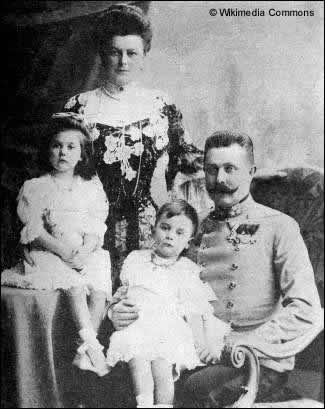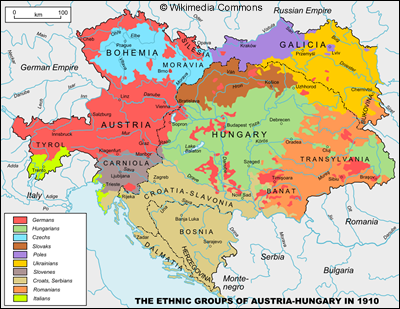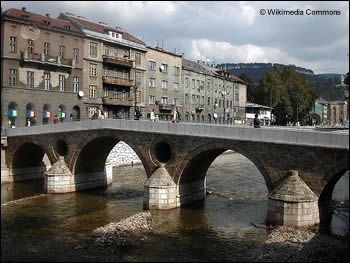The act of ‘political terrorism’ which propelled two great alliance systems into the First World War was the assassination of Archduke Franz Ferdinand (heir apparent of the Austrian throne) and his wife Sophie, in Sarajevo, the capital of the Austro-Hungarian province of Bosnia. The culprit, Gavrilo Princip, was a Serbian nationalist who carried out his act on 28th June 1914, and just a month later, Austro-Hungary declared war against Serbia. What should have been a internal skirmish accelerated into an unprecedented European war… but why?
 |
The ‘Triple Alliance’ and the ‘Triple Entente’ were intended to be the mechanisms put in place to enhance the security of each country and to deter individual aggressors, but these exact mechanisms helped to generate a war from a local crisis, engulfing all the powers of Europe. But the long-term causes for this war lay deep in European history and can be traced to many forces that called for new and ever changing alliances between newly formed countries, as well as the traditional great powers. Some of these great powers were desperate to further their own imperial ideals and lead to the protection of individual borders even at the risk of general war.
The previous century’s industrial revolutions and the rapid industrial growth in England in the late 18th century, in France in the early 19th century, and then in Germany after 1870, allowed each dynasty and rival to develop their own technologies and make attempts at expansionism. Each nation or state built power bases to protect themselves as their militarism grew. The ability to mobilise mass populations into armies and to train these well was part of each realm’s aim. Each had access to mercenaries that were well trained and well equipped. All had access to cannon, skills, industrialisation, infrastructure and invention. In turn this lead to the instability of international, as well as domestic, politics. The Austrian ‘House of Habsburg’ had been brokering dynastic marriage contracts for centuries, increasing the family’s portfolio of European territories, and despite Queen Victoria’s efforts in marrying off her off-spring into European royalty, friction between these families still remained. It was this, together with religious differences between Muslims and Christians and Roman Catholics and Protestants which was threatening the ‘balance of power’ in Europe.
The rise of a social Darwinist ‘world view’, with its belief in the struggle for survival and the survival of the fittest, was cause for much change. It was a struggle not only by individuals, but also by nations, causing a flurry of imperial and military competition.
The notion of nationalism had long been inspired by the French Revolution of 1789 to 1799. Yet by the end of the Napoleonic Wars in 1815, the European continent was still a collection of princely states that were weary of the heavy burdens of war. The idea that people with the same language, customs and ethnicity within and without geographic borders had the right to self determination was blazing throughout the ‘old and new’ worlds. Belgium gained its independence from The Netherlands in 1830. Italy, which consisted of a conglomeration of small city states, some of it ‘foreign owned’ was unified in 1861. Rivalry of political and family factions caused localised clashes and disputes.

After the 1848 revolution in German speaking lands, the Prussian army became victorious and powerful. King Wilhelm I, at the head of this revolution, set up a ‘liberal’ constitution and government by decree. By this constitution, Prussia had a higher standing than the Austro-Hungarian regime. Then the Franco-German War of 1870-71 established Prussia as a leading power among other Imperial German states. The many German principalities and fiefdoms became a confederation in 1871, to become the first German state. Otto von Bismarck was appointed as Germany’s first chancellor. The Prussian army absorbed all previous military forces, with the exception of the Bavarian army, which remained autonomous in peacetime. From this point Prussia’s history merged largely into that of the German Empire.
Now, more than ever, imperialistic ideals abounded – nations were unifying and emerging into what became known as ‘global imperialism’, buoyed by economic self-interest and materialistic growth. The newest country wanting recognition and material wealth and power was the United States of America. From its formation in 1787, America desired access to European markets, both for industry and agriculture. France, Britain and Germany had bitter rows about the competition for colonial markets throughout the nineteenth century, especially in Africa. These accelerated between 1898 and 1914 when many near misses to fighting between these three powerful nations had been narrowly avoided.
The Austro-Hungarian empire was fast losing its Hungarian holdings. It had enormous regional and ethnic differences which stretched from the Swiss Alps to Bukovina (a region on the northern slopes of the north-eastern Carpathian Mountains and adjoining plains). Austria failed to recognise rising tensions between German and Czech speakers, but the continual clashes about Hungarian tariffs and the Hapsburg’s treatment of minorities was always on the boil.
The growth of Imperial German industry, its building of infrastructure and development of a well-ordered army, was a powerful incentive (especially for Italy) to form an alliance. In an attempt for greater prosperity and to stave off a possible aggressor, Germany, the Austro-Hungarian empire and Italy formed ‘The Triple Alliance’ in 1882. Designed as a ‘defensive alliance’, each member promised mutual support in the event of an attack by any two other great powers, or for Germany and Italy, an attack by France alone. As a counter move, Britain, France and Russia formed the ‘Triple Entente’, in the event that hostilities break out. Thus we had two modern and thriving imperial blocks of power attempting to ensure peace for its nations and security for its peoples, as modernisation, industrialisation and growth threatened a shift in ‘world power’.
 |
Site of the assassination of Archduke Franz Ferdinand
The last German Emperor was Queen Victoria’s grandson, Wilhelm II or ‘Kaiser Bill’ as he was more commonly known, whose succession followed his father’s 99 day reign in 1888, following the death of Wilhem I. He made a series of political blunders, including the dismissal of Bismarck, and an ill-advised visit to Tangiers which resulted in the Moroccan Crisis of 1905/06, threatening French interests and putting the ‘Triple Entente’ to the test.
Meanwhile in the Balkans, Austro-Hungary annexed Bosnia and Herzegovina. War was avoided because Russia backed Serbia in an attempt to gain a right of passage through the Strait of Bosporus to the Black Sea. This failed, and added to the permanent rift between Austria and Russia. In 1908 the Young Turk Revolution gave the Ottomans renewed spirit for autonomy and hope for expansion. Next, Italy declared war on the Ottoman Empire in 1911, as it encroached towards the west.
War was brewing and the Austrian court was in a shambles. From 1906 onward Archduke Franz Ferdinand took over more military matters and in 1913 he became Inspector-General of the army. In foreign affairs he tried, without endangering the alliance with Germany, to restore Austro-Russian understandings. At home he thought of political reforms that would have strengthened the position of the crown and weakened that of the Magyars against the other nationalities in Hungary. His plans were based on the realisation that any nationalistic policy pursued by one section of the population would endanger the multinational Habsburg Empire.
Inspector-General Franz Ferdinand was visiting the troops in Sarajevo when he met his death. The Austro-Hungarian regime believed the assassination to be an act led by the Serbian government and with the backing of the Russian Empire. So, on the 28th July 1914, Austria, believing that war would ultimately preserve her empire, declared war on Serbia, and as a consequence, Russia began mobilising against Austria.
Germany sent its ultimatum to Russia demanding them to demobilise immediately, which they refused, so on the 1st of August 1914, Germany declared war on Russia. France, being in alliance with Russia, began to mobilise its military forces and in retaliation the German Empire declared war on France on the 3rd August 1914.
Belgium, who had been assured neutrality by all the major powers, called on them to stop German soldiers marching through its borders towards France. Britain, although not in a direct alliance with Belgium, demanded that the German Empire should observe Belgium’s neutrality, which it refused.
Britain declared war on the German Empire on the 4th August 1914 and the Great War, the war described as ‘the war to end all wars’ had begun…
Editor’s note: Have you uncovered the story of your WW1 ancestors? We are looking to feature these in our November issue of the magazine. If you would like to contribute then, please contact us.
Delightful Dukkie
© Delightful Dukkie 2010
BIBLIOGRAPHY
The Rise and Fall of the Great Powers
Paul Kennedy
Random House New York 1987
Europe – A History
Norman Davies
Pimlico Random House 1997
Microsoft Encarta Encyclopedia Disc 2000
Encyclopedia Britannica Disc
Oxford University Press 2001